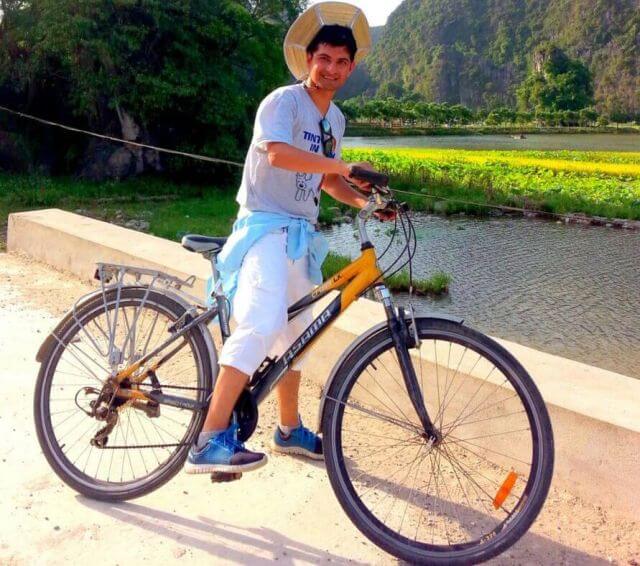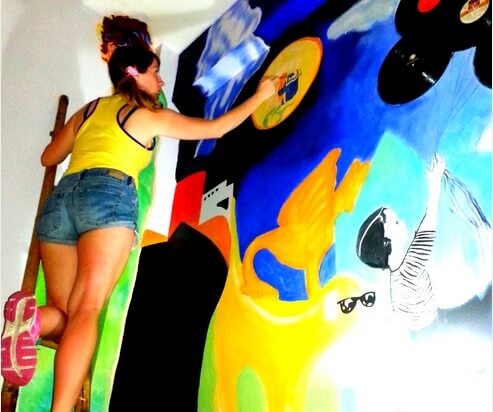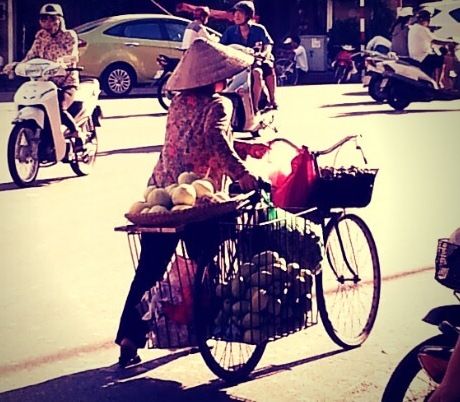How do you write about Hanoi? Shall one begin with the sights – Crimson flags and city contours or the smells – Durians and Dragon fruits? Or perhaps with the overcast impression that this capital paints, that of waiting without being in transit. What does Hanoi wait for? Because there lies this world which grieves no more for all the terrains and all the tenants, it left behind.
Hanoi means “the city in the bend of the river”. With over six million people and as many mopeds, there is but a method to this madness. Yet for someone accustomed to Indian roads, this wasn’t as cumbersome. But wait, Google can tell you that.
Kaalicharan, the revered hermit of the Himalayas, once told me on my escapades:
“Don’t tell me, my lad, of how waves washed up the shores or the humidity you could taste in the wind, we’ve got Google for maps and weather updates. Tell me of the stories and the people in them. And dogs. Of the familiar and the foreign, tell me what you saw when the camera lens was shut, what you heard when all sounds were, but a distant blur.”
And try I shall.
The crimson communism of Vietnam has an unconventional aura to it, an affable charm which is a distant hue from what the history textbooks would tell you. Woven with decades of resistance against the western threats, stirred and scarred and yet retaining its warmth, the red of Vietnam is friendly not fragile, self-reliant but collaborative. Hot and humid but warm and welcoming. Vietnam with its pagodas and perplexities presents much more to the senses.

This Beauty in chaos is synonymous to everything that is Vietnamese. From the multitude of mopeds to ease with which men and machines co-exist. Unlike the rest of Southeast Asia wherein congestion and mobility are at full throttle, Hanoi is an exception. It is modern yet deeply rooted in its past. It has not traded shops for departmental stores, markets for malls and community for commerce. The Old Quarter’s streets bustle with the business. There are still lanes dedicated to merchandise, their names drawing inspiration from the artifacts being sold there – Hang Quat (flags), Hang Gai (silk) and so on.
In between the sidewalks, vying for space with mopeds, there are rows of stalls – fruits, barbers stools, noodles, green tea, draft beer, bamboo bong and more. A series of mini-kitchens, a perennial fête on offer.

Near the ribbon of trees that surround Hoàn Kiém lake, the revered silence interrupted by sights, not sounds. Boys practicing Tai chi, an old blind woman selling cold drinks by the marble edifice and life floating somewhere in the scene. In local language, Hoàn Kiém lake translates to ‘Lake of the Restored Sword’ – legend has it that the Vietnamese once used a magical sword to drive the Chinese occupants from their lands, before a giant tortoise grabbed it and disappeared into the lake. Supposedly giant turtles still live in this lake.

At the boulevard, intricately woven artworks showcasing Halong Bay and Sapa valley are on sale. I wonder if these proud proponents of art have ever had a chance to visit the places that they have so aesthetically portrayed. Years of turmoil have not waned their smiles. These artists form the five million people still hereditarily affected by the Agent Orange dropped by the USA. The warmth with which Vietnamese kids greet Americans is a distant image of this violence-ridden past that they share. In a way, it harbors hope for the future too.
What more could you want?
Hanoi remains there for me. And tell me, if you’d please, How do you miss a place you haven’t left yet?

Nostalgia is that longing for what you’ve lost – time, place or person. I am not in Vietnam as I type these words, but Hanoi isn’t lost to the calendar. It is with me, all the time. From the dormitory that reminded me of my boarding school to the countryside cycling. Unlike Kaalicharan, who has a trajectory she calls home, I often am displaced wherever I am. It is the same resistance which broils in me when well-meaning humans ask me to buy a property. For someone like me who moves in between little camps or rented premises, this idea of calling urban concrete for the home is hard to distill. Far off from the security that they say is a 2 BHK apartment, I am not even in bare essence a backpacker. For I am not brave enough to be on exile for years. Somewhere in between, I must be, or so I think.

Over the years, I’ve lost among other things – baggage, lovers sand sanity, to name a few. Vietnam was no exception wherein I lost my wallet but found my sanctum.
What does Hanoi wait for? Why doesn’t it gather itself up and follow neighbouring capitals like Bangkok? I didn’t have such questions. In fact, I love the intermittent pause this city revels in. I shall return here again. Perhaps when I am in love. For to wait in unison with a city that has forgotten time and all its ailments would be another adventure altogether.
Hanoi waits for you.




Lovely piece bro. Clearly my desires are far more mundane – as the single most spectacular memory I have carried of Hanoi is squatting on a red brick on the roadside while a grandmotherly sort ladles wonderfully fragrant Pho into a rather large bowl. Heaven in my mouth for the princely sum of $ 1 USD. For this I will be back.
Thank you Krishnan, it is indeed an honor for this dog to see your name here:) *Drum Rolls*
I haven’t travelled as far and wide as the globe-trotting you, but I know enough to deduce that when you say it, it means we all ought to be back in the Neverland that’s Hanoi.